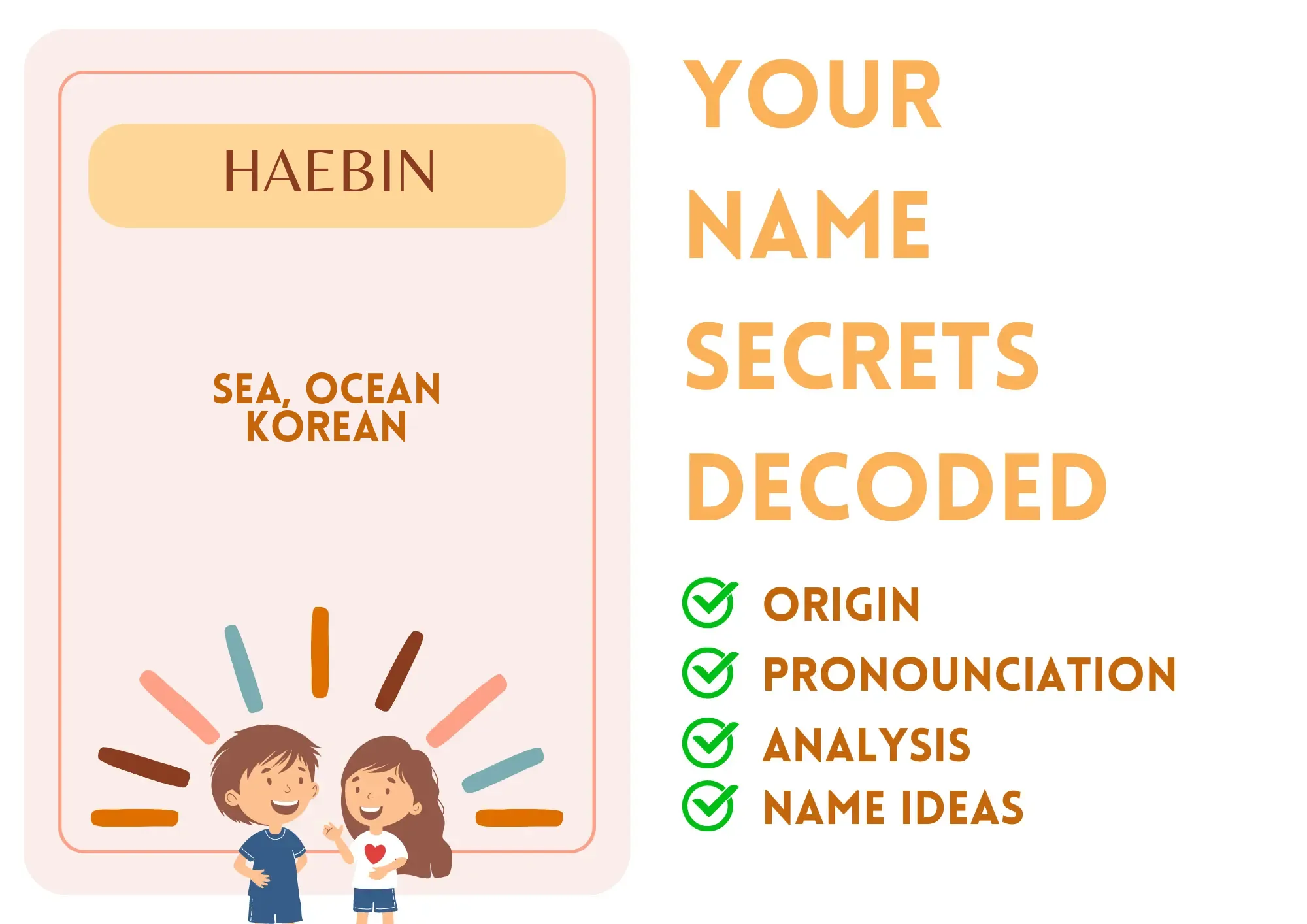
Haebin
Haebin is a unique and culturally rich name of Korean origin, meaning ‘sea’ or ‘ocean.’ Often used in South Korea, it is primarily a unisex name, though it is more commonly given to females. The name carries significant cultural importance, evoking imagery of vastness, depth, and tranquility associated with the sea, making it a popular choice for parents wanting to impart a sense of calm and beauty.
People generally perceive Haebin positively, associating it with serenity and the vast possibilities that the ocean embodies. The name is relatively easy to write and pronounce, with common nicknames including Bin or Hae.
Haebin has recently gained visibility in popular culture through Korean dramas and music, often characterizing strong, independent individuals. Its associations with nature and tranquility make it appealing to many parents.
Basic Information
Gender: Unisex
Sounds Like: HAY-bin
Pronunciation Explanation: The first syllable 'HAY' rhymes with 'day,' and the second syllable 'bin' sounds like the English word for a container.
Summary and Meaning
Meaning: sea, ocean (Korean)
Origin: The name Haebin has Korean origins and is derived from the natural beauty associated with the ocean.
Usage: Haebin is predominantly a unisex name, suitable for both males and females, although the female usage is more frequent.
Name Number (Chaldean)
Name Number (Pythagorean)
Popularity (Global Rank)
Overall: 254222
Boys: 72681
Girls:
Most Popular in
Religious and Cultural Significance
Religion: Buddhism
Background: In Korean culture, especially influenced by Buddhism, the ocean symbolizes wisdom, tranquility, and continuity, resonating deeply with many Korean beliefs.
Cultural Significance: Haebin is appreciated for its connection to nature and its calming associations. It reflects a cultural tie to the environment and is favored for its smooth phonetics and uplifting meaning.
Historical Significance: Haebin reflects a historical appreciation for nature in Korean culture. The ocean has been a source of sustenance and inspiration, deeply woven into the country's folklore and symbology.
Popular Culture
Literature and Mythology: The name Haebin may appear in contemporary literature and Korean tales, often embodying characters who are connected to the sea or embodying serenity.
Movies and Television: Characters named Haebin often feature in K-dramas, where they symbolize strength and resilience, sometimes portrayed as characters with deep emotions tied to family and nature.
Feelings and Perceptions
Perception: Haebin is usually perceived as a tranquil and beautiful name, evoking feelings of calmness and depth. It is well-received in both Eastern and Western contexts, although it may be less familiar to those outside of Korean culture.
Positive Feelings: Tranquil, serene, beautiful, nature-connected, unique.
Negative Feelings: May be difficult to unfamiliar speakers in terms of pronunciation initially.
Practical Considerations
Ease of Writing and Calling: The name Haebin is relatively straightforward to write and pronounce, consisting of six letters and two syllables, making it easy to remember and use in conversation.
Common Typos and Misspellings: Haebenn,Heybin,Haebin,Hebin
Common Nicknames: Bin,Hae,Binnie
Haebin Popularity
Haebin Usage and Popularity By Country
| Country | Rank (Overall) |
|---|---|
| South Korea | 4921 |
| Japan | 26195 |
| Canada | 52966 |
| Netherlands | 70785 |
| Mexico | 78583 |
| United States | 102851 |
| United Kingdom | 182431 |
Haebin Usage and Popularity By City
| City | Rank (Overall) |
|---|---|
| Seattle | 17340 |
| Vancouver | 12900 |
Compatibility Analysis
Famous Persons Named Haebin
No results found for Haebin.
Related Names
Similar Sounding Names:
Haeyoon,Haejin,Sihae,Haeun